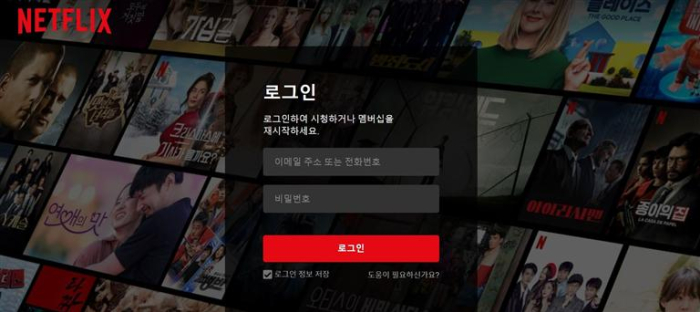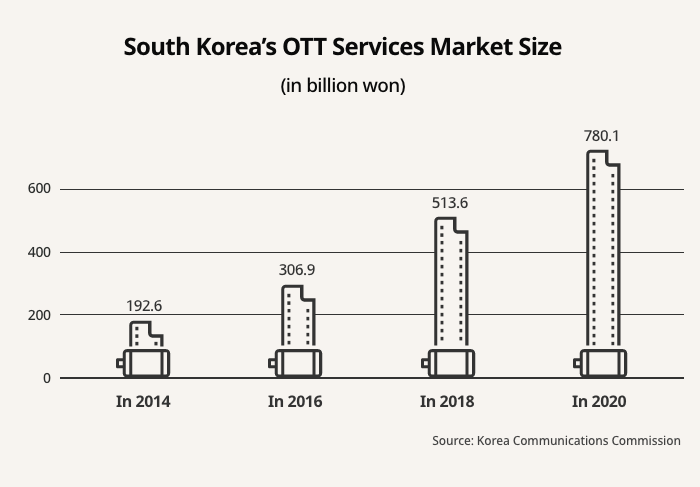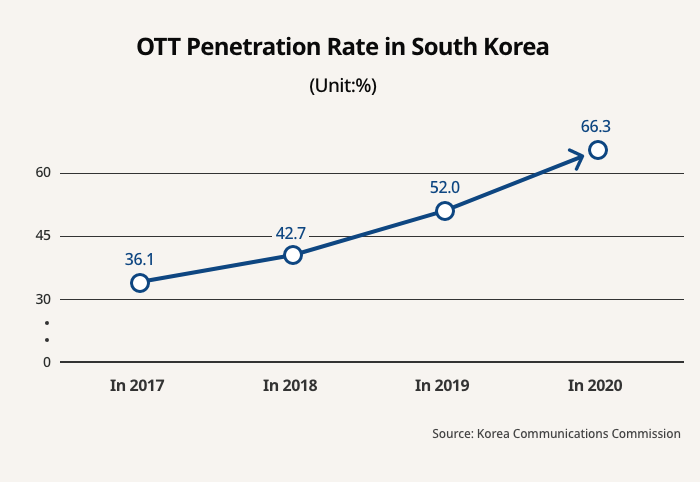Entertainment
Netflix loses first court case over network usage fee
Seoul court makes world's first ruling over a dispute between an OTT platform and a broadband firm
By Jun 25, 2021 (Gmt+09:00)
4
Min read
Most Read
LG Chem to sell water filter business to Glenwood PE for $692 million


Kyobo Life poised to buy Japan’s SBI Group-owned savings bank


KT&G eyes overseas M&A after rejecting activist fund's offer


StockX in merger talks with Naver’s online reseller Kream


Mirae Asset to be named Korea Post’s core real estate fund operator



In April 2020, Netflix filed a complaint against SK Broadband Co., rejecting the Korean internet provider's demand that the streaming platform pay for network use in South Korea.
The legal action has drawn attention because it marks the world's first legal conflict between an OTT platform and a broadband company. South Korea is one of the world's fast-growing OTT markets, where Netflix posted triple-digit earnings growth in 2020 from the year previous.
On June 25, the Seoul Central District Court rejected the case brought forth by Netflix, while dismissing Netflix's claim that the OTT platform has no obligation to negotiate with SK Broadband over the network use charges.
"It needs to be determined by negotiations between the parties involved whether or not some fees will be paid, or whether they enter an agreement in accordance with the principle of freedom of contract," the court ruling reads.
Netflix offers movies, TV drama series and other content on the internet to its paid subscribers. With the streaming service giant taking up the biggest portion of the country's OTT market, SK Broadband has suggested that Netflix share the costs related to internet traffic growth.

Back in November 2019, the broadband arm of SK Telecom took the case against Netflix to the Korea Communications Commission, but the two companies failed to reach a settlement.
"Netflix has not been paying network usage fees, or something equivalent to the fees claimed by SK Broadband, to any one of the ISPs (internet service providers) in the world," the streaming service firm said in a Korean statement, released in an immediate response to the court ruling.
"None of the government agencies, nor courts in the world, forced CPs (content providers) to pay network usage fees to ISPs. It is because there is no legal basis for the fees and they are against internet governance principles."
It was not immediately known whether the US company will appeal to a higher court.

"Internet connection is basically a paid service. As Netflix has paid telecom companies for network use in the US and Japan, it also needs to pay in Korea," said SK Broadband.
In the US and France, Netflix is said to pay telecom operators for broadband service, but it is not been stipulated as a network usage fee. In Japan, however, Netflix said that it only pays a fee for getting necessary services for running Open Connect appliances, or servers designed for the delivery of streaming video content, instead of a charge for network use.
WHO'S NEXT?
Telecom industry observers said the lowest court ruling laid the groundwork for domestic broadband providers to charge global OTT companies for internet usage. That could result in a drastic increase in their subscription fees.
The court verdict is likely to apply to other global OTT players preparing to enter the Korean market, including Disney Plus, Apple TV Plus, Amazon Prime and HBO Max. The Walt Disney Company’s OTT service is expected to land in South Korea later this year.
"This ruling made it clear that Netflix is owing to the ISPs, enabling them to enter renegotiations with OTT platforms for network usage fees," a telecom industry source told The Korea Economic Daily.
In comparison, the country's two platform behemoths -- Naver Corp. and Kakao Corp. -- have been paying 70 billion won ($62 million) and 30 billion won annually to ISPs.

"Netflix is highly likely to pass the surging costs on to its subscribers to make up for them," said an OTT company source. "Considering that it could set a precedent for its global services in other countries, Netflix may sharply increase domestic subscription fees."
But Netflix drew a distinction between itself and Korean OTT rivals, saying that unlike Korean content providers, it has not been provided with internet networks, nor relevant services by SK Broadband.
In South Korea, Netflix boasts around 4.1 million paid subscribers with a share of 4.8%.
Write to Han-Gyeol Seon, Jin-Suk Choi and Hyun-Ah Oh at always@hankyung.com
Yeonhee Kim edited this article
More to Read
-
 [Exclusive] MediaNaver to gain toehold in OTT market via CJ ENM
[Exclusive] MediaNaver to gain toehold in OTT market via CJ ENMJun 02, 2021 (Gmt+09:00)
4 Min read -
 [Exclusive] OTT streamingKakao joins OTT race with INISOFT acquisition
[Exclusive] OTT streamingKakao joins OTT race with INISOFT acquisitionMay 27, 2021 (Gmt+09:00)
3 Min read -

Comment 0
LOG IN


